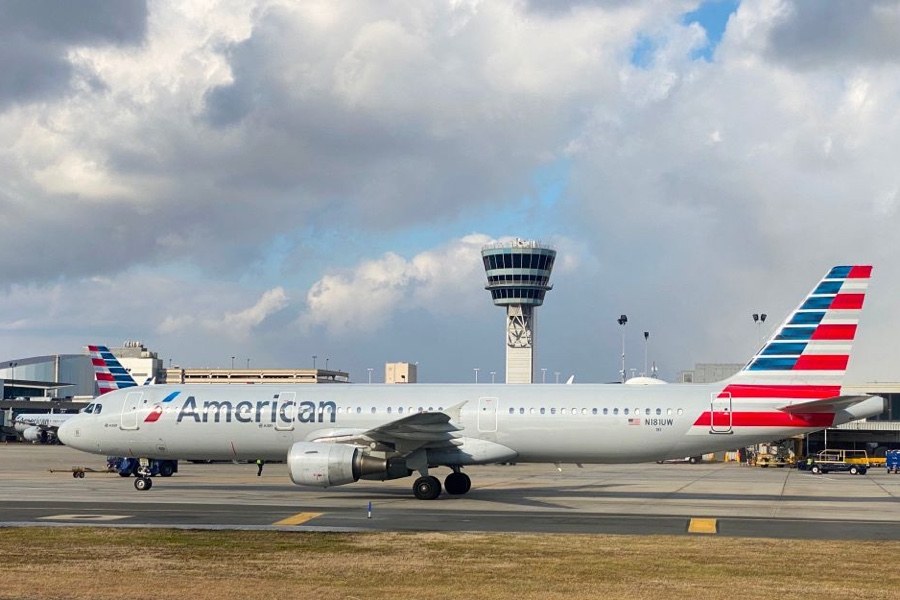How to Cancel and Get a Refund for Your Upcoming Flights Out of PHL
As the coronavirus crisis threatens summer travel, here’s what you need to know about cancellation and rebooking policies for airlines at PHL.

An American Airlines Airbus A320-211 is seen on the tarmac on January 8, 2020 at Philadelphia International Airport (PHL) in Philadelphia, Pennsylvania. (Photo by Daniel SLIM / AFP) (Photo by DANIEL SLIM/AFP via Getty Images)
Under normal circumstances, summer months drive crowds of people to cross the country and go abroad for much needed vacation time. But with the coronavirus pandemic looming larger every day, more people are wisely canceling travel plans and temporarily putting their dreams of jet setting to bed. And thankfully, to protect our pockets in the process, the U.S. Department of Transportation ruled last week that, in light of the pandemic, all airlines must refund passengers in the event of cancelations or major schedule changes.
Philadelphia International Airport (PHL) is currently not receiving flights from Europe and has no plans to do so until at least June 4th, according to PHL communications director Florence Brown. But what should you do if you want to cancel flights for plans beyond that date? With airlines telling travelers not to call customer service unless they’re within 72 hours of their travel date and with constantly evolving policies, it seems like everything is unclear. To help you navigate rescheduling your flights and getting refunds when possible, we rounded up the current cancellation and refund policies for PHL’s five main airlines below.
American Airlines
While American Airlines has dramatically reduced their air traffic and will now have to abide by the Department of Transportation’s ruling on refunds for canceled flights, the company still prioritizes rebooking policies for travelers whose flights haven’t been cancelled.
If you purchased a ticket before March 1st for a flight booked for travel up until May 31st, the usual rebooking fee will be waived. But all new tickets must be reissued for travel on or before December 31, 2020.
Likewise, if you booked a trip at some point between March 1st and April 30th for any future travel, American Airlines will allow you to change your reservation free of charge. But for both of these rebooking options, you’ll be responsible for covering any fare differences.
You can find updates to American Airlines’ policy here.
Southwest Airlines
Southwest is notorious for its generous schedule change and cancellation policies, and its policies seem to be holding up during the pandemic. All you have to do is cancel your flight at least ten minutes before departure in order to use funds from a nonrefundable ticket on another flight. Those funds won’t expire until June 30, 2021. And for Southwest travelers who had funds set to expire between March 1-June 30, 2020, those funds now won’t expire until June 30, 2021 as well.
As of Wednesday, all international flights to the Caribbean and Mexico are suspended until late May or late June, depending on the destination. But keep an eye out for further updates on extended cancellations or self-quarantine orders, depending on both flight destination and origin.
You can find updates to Southwest Airlines’ policy here.
Delta Airlines
All canceled flights through Delta, which has cut nearly 80 percent of its air traffic volume, are eligible for refunds. In one of the most flexible airline policy updates, Delta is providing travelers whose plans were impacted by the pandemic with a two-year rebooking window.
If you have tickets booked through Delta for travel in April or May 2020, or if you have eCredits or canceled travel from flights booked for March, April, or May 2020, you can now rebook that travel without any change fees until May 31, 2022.
If you purchased tickets through Delta at some point between March 1 and May 31, 2020, you’ll have a one-year free rebooking window from the date of purchase.
You can find updates to Delta Airlines’ policy here.
Frontier Airlines
Frontier has comparatively fewer options for its coronavirus-impacted travelers. For all tickets purchased before March 10, 2020 with travel up until April 30, 2020, Frontier will waive fees for a one-time itinerary change. Likewise, for any tickets purchased between March 10, 2020 and April 15, 2020, travelers can also make a one-time change without fees.
Travel credit from any changes or cancellations has to be used within 90 days. The latest date that Frontier allows its customers to rebook their travel to is November 9, 2020.
You can find continued updates to Frontier Airlines’ policy here.
United Airlines
United has cut over 90 percent of its international schedule and has made severe cuts to its domestic schedule as well. All canceled flights are eligible for refunds.
Additionally, change fees for global travel will be waived for customers whose tickets were issued on or before March 2, 2020 for travel from March 3, 2020 to May 31, 2020. All new tickets must be reissued by December 31, 2020, and all travel from these reissued tickets must begin within 12 months of the originally scheduled travel date.
Change fees are also waived right now for any flights booked by April 30, 2020, and you can make changes at any time within the next 12 months.
Be wary of fare differences when rebooking, though. If a rebooked flight is cheaper than the original one, you won’t receive a refund for the surplus. In that case, it’s better to cancel your flight instead of changing it, so that you can book a new flight at the cheaper price and use the leftover credit toward another future ticket.
You can find continued updates to United Airlines’ policy here.


